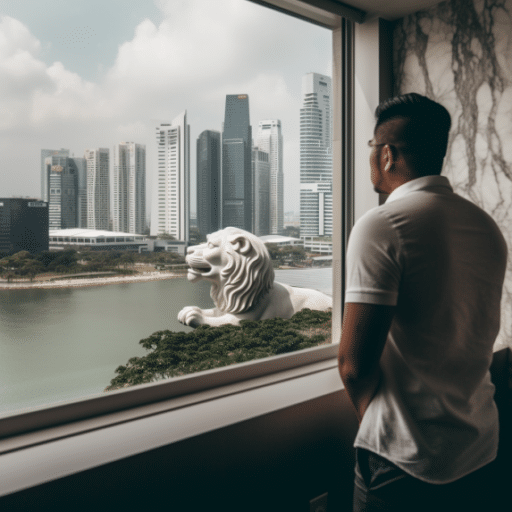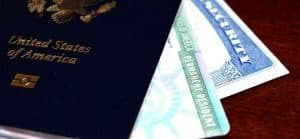This article will discuss how to get permanent residency and citizenship in Singapore.
For questions about second residency or citizenship services, I am available by email (advice@adamfayed.com) or on the chat function below.
Firstly, what is permanent residency? – the right that is given to the foreign citizens to reside in a country permanently is known as the ‘Permanent Residency Status’. The person who acquires the permanent residency status is able to reside in the country (which grants permanent residency status) for the rest of their lives.
By acquiring permanent residency, the person is able to apply for the citizenship of that country as well. Most immigrants choose to live in other countries depending on their necessities such as job opportunities, retirement, access to well-developed economically advanced living standards, etc.
Generally, most people apply for permanent residency status in order to achieve work permits in other countries. Many countries of the world provide permanent residency status to foreign citizens who are willing to live in their country. the person who wants a permanent residency status is required to have the eligibility criteria and follow the general set of rules set by that country’s government.
The countries which provide permanent residency status to foreign residents are:
- Argentina
- Australia
- Bahrain
- Belize
- Brazil
- Brunei Darussalam
- Canada
- Chile
- China
- Costa Rica
- Dominican Republic
- Ecuador
- Countries of the European Union (‘Austria’, ‘Belgium’, ‘Bulgaria’, ‘Croatia’, ‘Cyprus’, ‘Czech Republic’, ‘Denmark’, ‘Estonia’, ‘Finland’, ‘France’, ‘Germany’, ‘Greece’, ‘Hungary’, ‘Ireland’, ‘Italy’, ‘Latvia’, ‘Lithuania’, ‘Luxembourg’, ‘Malta’, ‘Netherlands’, ‘Portugal’, ‘Poland’, ‘Romania’, ‘Slovak Republic’, ‘Spain’, ‘Slovenia’, ‘Sweden’, and ‘United Kingdom’.)
- Ghana
- Guatemala
- Hong Kong
- India
- Iran
- Israel
- Japan
- South Korea
- Macau
- North Macedonia
- Malaysia
- Mexico
- Nicaragua
- New Zealand
- Norway
- Panama
- Peru
- Philippines
- Russia
- Singapore
- South Africa
- St. Kitts and Nevis
- Switzerland
- The Republic of China (‘Taiwan’)
- Thailand
- Trinidad and Tobago
- Ukraine
- United States
In each country, the person who has acquired the permanent residency status would be called with different names (such as lawfully admitted for permanent residence in the United States). Although the names might differ, the actual concept of the permanent residency in the above-mentioned countries is the same.
Some countries allow the citizens to acquire dual citizenship while some countries don’t permit the person to have dual citizenship, which means the person would have to be the citizen of the country which they apply for the permanent residence status.
‘Immigrant Investors Programs’ – also known by the names ‘Citizenship by Investment’, ‘Golden Visa Program’, and ‘Golden Passport Program’, Immigrant Investors program allows the investors of other countries gain a permanent residency in their country by making an investment in their country’s assets, which can be real estate, stocks, welfare, etc.

The main concept of the Immigrant Investors program is to lure the investors of foreign countries to invest their capital into their country by offering them residency and citizenship. These types of visa programs generally have certain terms and conditions that need to be satisfied by the investor in order to gain the visa of that country.
Mostly the requirements set by the visa programs include 1.) Making an investment in companies or industries, so that at least 10 jobs are created for the native individuals., 2.) Purchasing or investing in the real estate of that country, 3.) Starting a company that would create at least 10 jobs for the existing native residents of that country, etc.
Such types of activities are helpful to develop the economy of a country and aid in the social welfare of its citizens. The countries which have the highest number of applicants who choose to invest may be able to attain economic advancement.
The lowest amount that is required to get a permanent residency is $100,000, which is in Dominica. The highest amount that requires to be invested in order to attain permanent residency is £2 million, which is in the United Kingdom.
Some countries such as Cyprus, Malta, etc. are known to offer citizenship along with permanent residency to the investors in order to attract more foreign investors to make an investment in their countries.
There exists a time period for most of the countries and until the completion of this time period the investor is not able to access their investment. Generally, the time period would be until the permanent residency is granted to the person.
Portugal, which is well-known for its Golden Visa program, started the visa program in the time of Great Recession and was able to attract a lot of foreign investors into investing in the real estate of the country. It was estimated that up to 2016 Portugal was able to grant 2,788 golden visas to individuals and the majority of the people were of Chinese nationality.
Permanent Residency in Singapore:
The permanent residency or the Immigrant Investors program in Singapore is known as the ‘Global Investor Program (GIP) of Singapore’. The GIP of Singapore allows a foreign individual access permanent residency in Singapore by making an investment in Businesses or Funds which have been approved by the Global Investor Program (GIP).
‘Singapore’ – People may think “why Singapore?”, coming to that, Located in Southeast Asia, Singapore is a sovereign island state. It is considered as one of the most developed economies of the countries in Asia. Some of the major things that come to mind when we think about Singapore are ‘Clean Streets’, ‘Modernized Infrastructure’, ‘Strict Laws’, etc.

Singapore is a very small country and considered to be smaller than many cities in the world. Although being small, Singapore has managed to obtain a well-developed economy, excellent living standards, etc.
Although English is considered the official language of Singapore, we can be able to find some other languages such as Malay, Mandarin, etc. Most of the cultures that can be observed in Singapore are Indian, Malaysian, Chinese, etc.
Singapore is a highly developed and advanced economy among most countries of Asia. People might be able to experience diversity among races and cultures in Singapore. Besides that, Singapore has a highly advanced Educational and Healthcare system.
It also offers residential properties to the citizens from the Housing & Development Board and people can be able to acquire loans with lower interest rates for housing.
Some other advantages are that Singapore has no net debt and is the second freest economy in the world. It has also been considered as a peaceful country.
Singapore is among one of the countries that provide permanent residency status for investors. the passport is considered to be the second most powerful passport in the entire world. The person gains a Singapore citizenship is able to have visa-free or visa-on-arrival access for 189 countries. They can even be able to travel to destinations such as the ‘Canada’, ‘China’, ‘United States of America’, and ‘Europe’s Schengen Area’.
Among all the benefits there are some disadvantages as well while having citizenship in Singapore. Singapore is one of the countries among those which are based on single citizenship. Hence, it is better to think about citizenship before applying as it might be ideal for the people who want to have more than one citizenship.
Another disadvantage is that it is mandatory for all the citizens of Singapore to offer military services to the country. there is an exception for children, old people, and women. Unless you are an old man or a lady, you would definitely have to serve Singapore’s military.
If you are a person who wants to gain permanent residency in Singapore and are able to afford some money for that, then you might be able to attain a permanent residency in Singapore by following the necessary procedure set by the GIP of Singapore.
Many people have doubts related to residency and citizenship in Singapore through investment. Hence, in this article, we will go through all the requirements, details, queries, and FAQs on this topic.
‘Singapore Entrepass’ – This was one of the second residency programs through which a person was able to obtain a second residency program by starting a company in Singapore and be able to hire one or two native Singaporean residents.
For Example, Individuals were able open a restaurant with an investment of 250,000 Singapore dollars and hire a few workers (1 or 2) and qualify for the Singapore Entrepass.
This process was effective in the past and this is not as easy as mentioned above for the people nowadays. The process now requires grants or venture capital funding from a university or a list of approved financiers.
‘Singapore Employment Pass’ – Singapore offers two types of work passes to employees and entrepreneurs, while people of the skilled worker category are able to gain a skilled worker pass for the jobs having high demand in Singapore.
Entrepreneurs are able to hire themselves with the designation ‘Director of the Company’ for the companies they start in Singapore. But the most important thing to consider while doing this is that starting a company might not be advantageous to most people and Singapore imposes taxes to the businesses with 17% annually on their income.
However, there is an availability of work permits for the people who have a strong need to go to Singapore such as opening a new market in Asia. In such cases, the person is able to get a work permit as an employee of their own company.
It is suggested to think twice before taking the necessary actions to attain an Employment pass as an entrepreneur as the process is hard for beginners and some other issues such as the requirement for the person to pay themselves (at least 125,000 Singapore dollars, which is approx. $100,000) as the director of their company out of which a tax of 20% on salary is deducted.
This means there are many taxes (including taxes on business, salary, etc.) and the person also has to deal with the higher costs of living. Hence, it won’t be considered as an ideal option.
‘Global Investor Program’ – If a person is able to invest in the welfare of the country (by investing in GIP approved businesses and funds) and support the country’s economy by funding it, then they will be able to acquire a ‘Singapore PR (Singapore Permanent residency)’. Every year, thousands of investors apply for Singapore PR and become the permanent residents of the country.
A person’s whole family can be able to apply for Singapore PR. By meaning family, we refer to the spouse and children (who are under 18 years of age and are unmarried). The person’s children who are above 18 years and parents can be eligible for the ‘Long Term Social Visit Pass (LTSVP)’, which is valid for 5 years and is renewable. The LTSVP is based on the re-entry permit of the individual.
Any person who has been residing in Singapore for more than two years is able to apply for Singapore citizenship. Most of the benefits and privileges that can be enjoyed by the citizens of Singapore are also applicable for the individuals having the Permanent Resident status.
The main advantage that people with the PR status have is that they can be able to live permanently in the Singapore avoiding the difficulties they would have to face if they acquired the citizenship (such joining the military).
The process of obtaining permanent residency status in Singapore was very easy for so many years. By the time passed Singapore was full of diversity and many sectors were filled with foreign individuals. For example, the banking sector of Singapore mostly consists of people from other countries.
Getting Frustrated by this, the native citizens of Singapore, who felt that all their jobs were being taken over by the foreigners, brought forward this issue to the higher authorities. Upon their appeals, the government reduced the options available for foreigners to attain a PR status and therefore, the process became difficult.
However, the process was not so difficult for the investors who willing to obtain a PR status by making an investment, until the rules changed. Nowadays, the process is very lengthy and the PR status cannot be achieved until a long time.
The process of attaining permanent residency in Singapore is considered to be very lengthy and time-taking. Upon the completion of the first year as a resident in Singapore, it might take up to two years to acquire the PR status. This means it might take up to 8 or 9 years to attain the citizenship of Singapore.
Using the investment money, the foreign investor is able to either create a new company/enterprise or use it for the development of an already existing company.
However, the individual is required to provide proof to the authorities that the person can efficiently run a business to reach success. This applies to both the experience of the person as well as the planning of the business. Upon that, the government tries to create a partnership between foreign investors and local networks.
‘Investment options’ – there are two types of options available to the investors under the Global Investor Program. They are:
- Option 1 – An investment of at least 2.5 million Singapore dollars in a new business or for the development of an existing business.
- Option 2 – An investment of at least 2.5 million Singapore dollars in a fund (approved by the GIP), which invests in the companies of Singapore.
For the first option, the requirement for the minimum investment amount (S$ 2.5 million) should be met. The person should be able to submit an investment plan for 3 years along with the annual financial estimations. The person is also required to achieve the financial goals set by them for the three-year time period.
For the second option, the requirement for the minimum investment amount (S$ 2.5 million) should be met.
‘Eligibility Criteria’ – The person who is applying for a Singapore PR should be able to qualify for the following eligibility criteria.
- They should qualify for the required minimum investment amount of 2.5 million Singapore dollars in either of the above-mentioned two investment options.
- The person should be able to produce an entrepreneurial track record for at least a three-year time period.
- The person should also qualify for the business turnover requirements. The business turnover requirements are that the person should have had earned a minimum of S$ 50 million per annum or S$150 million or more over the last three years which would equal to S$50 million annually on average.
- The person should have at least 30% of the shares in the business if the business is not entirely owned by the individual.
- Financial statements that have been audited should be produced for the previous three years.
People who own more than one business are required to submit the details of the company having the highest turnover. The person can be able to select among their businesses in order to pick the one which qualifies for the eligibility criteria.
The GIP authorities also consider the details such as the position of the person in the respective company owned by them and the profits gained by the company.
The investor is able to choose from the list of sectors approved by the GIP program, for the company that they want to start or invest in. The list consists of
- ‘Aerospace Engineering’
- ‘Alternative Energy’
- ‘Automotive’, ‘Chemicals’
- ‘Consumer Businesses’
- ‘Education’
- ‘Electronics’
- ‘Energy’
- ‘Environment and Water Tech’
- ‘Engineering Services’
- ‘Healthcare’
- ‘Infocommunications Products and Services’
- ‘Logistics and Supply Chain Management’
- ‘Marine & Offshore Engineering’
- ‘Media & Entertainment’
- ‘Medical technology’
- ‘Nanotechnology’
- ‘Natural resources’
- ‘Safety & Security’
- ‘Space’
- ‘Pharmaceuticals & Biotechnology’
- ‘Precision Engineering’
- ‘Professional Services’
- ‘Lifestyle Products and Services’
By Lifestyle Products and Services, the GIP also includes storage facilities, theaters, production houses, sports academies, art galleries, museums, auction houses, art logistics, headquarters for sports-related companies, etc.
‘Application Process’ – There are some documents required for the Permanent Resident application as per the Global Investor Program. They are:
- Application form for the Permanent Residence of Investors.
- Form for the proposed investment plan for the business.
- Undertaking form of the Terms & Conditions of the GIP.
- Application form for an Entry Permit to enter Singapore.
- Other supporting documentation.
In the case of non-English documents, the translated versions should be submitted by the individual. After submission of these, the process might take somewhere around 6-8 months and then the person would be invited to an interview by the relevant authorities.

Once the application gets approved, the person is provided with an Approval-in-Principle PR valid for 6 months. During this six-month time period, the individual is required to make the investment. The person is required to submit the documentation of the investment such as share certificates and these are kept with the authorities for a five-year time period and will be received by the investor only after they attain the PR status.
After all the requirements have been met, the person is able to acquire a blue identity card (permanent resident status) and can enjoy all the privileges that are offered to the residents of Singapore.
After acquiring the permanent resident status, the person is required to renew their Re-Entry Permit (REP). The residency as a permanent is valid only with the help of a REP and the individual is required to renew this before the expiry date (every 5 years).
The renewal process can be done online and is considered as an easy process and can even be done online.
‘Citizenship’ – after being a permanent resident in Singapore for two years, any person can be able to apply for the citizenship of Singapore.
As we have discussed earlier that Singapore is based on Single Citizenship, all the other citizenships of the person should be given up by the person before the naturalization process.
People should also keep in mind that they would have to serve the country and participate in the national service for at least two years unless they are older than 60 years or female.
Once citizenship is acquired, the person is able to get a passport from Singapore and be able to travel to many destinations without having the requirement of a visa as we have discussed in the beginning.
How about tax on overseas income? – Like Thailand and Malaysia, Singapore doesn’t charge tax on overseas income.
‘Conclusion’ – Though there are many benefits of being a resident of Singapore, the person should be able to fulfill all the requirements mentioned above in the article.
Once the person feels comfortable with the investment amount and the procedure for attaining the PR status, they can be able to make an investment and get permanent residency in Singapore.
There are some residency and citizenship programs that are cheaper and also give you 0% on overseas income – Malaysia for example.
Singapore does have some unique advantages and you need to consider whether it is worth paying the premium for this.



